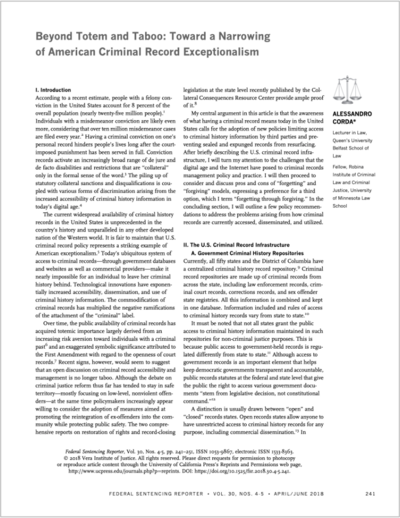Beyond Totem and Taboo: Toward a Narrowing of American Criminal Record Exceptionalism
Journal Article
Clean Slate
Topics:
Background Checks
Collateral Consequences
Criminal and Juvenile Records
Records Clearance, Expungement, and Sealing
Reentry population:
Adults
Date:
Source:
Federal Sentencing Reporter, Vol. 30, Nos. 4-5
Beyond Totem and Taboo: Toward a Narrowing of American Criminal Record Exceptionalism
As this article discusses, conviction records activate an increasingly broad range of de jure and de facto disabilities and restrictions that are, the author argues, “collateral” only in the formal sense of the word. The article highlights that the "piling-up" of statutory collateral sanctions and disqualifications is coupled with various forms of discrimination arising from the widespread availability of criminal records in today’s digital age. Public access to criminal records in America over time has acquired "totemic importance," according to the author, largely derived from "the symbolic significance of the First Amendment and increasing risk aversion toward individuals with a criminal past."
This article argues that the awareness of what having a criminal record means today in the United States calls for the adoption of new policies limiting access to and dissemination of criminal history information by third parties and preventing sealed and expunged records from resurfacing online. The article then contends that attempts aimed at limiting public access to criminal records need to be coupled with a robust and reliable process for determining rehabilitation that cannot depend simply on the passage of time. Finally, the article presents and discusses a procedure of judicially certified active redemption in which restoration of rights is earned through positive actions.




